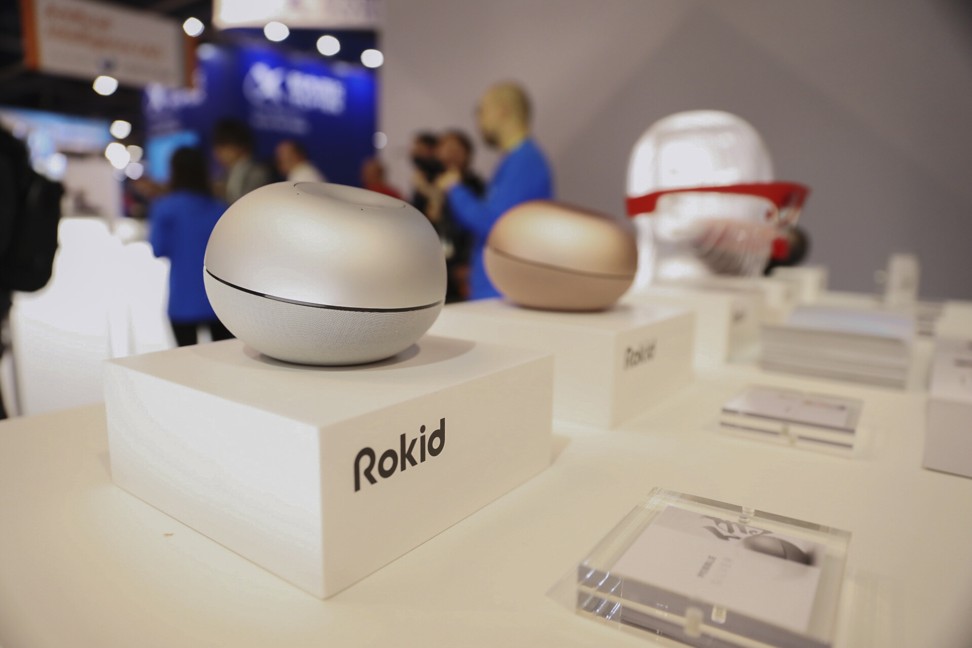
Glasses with facial recognition AI promise end to those awkward moments when you forget someone’s name
Rokid Glass can scan social media to match a face in front of you with a name in seconds, and that’s just for starters; created by Chinese start-up Rokid, the AR glasses generated a lot of buzz at CES 2018, and should hit stores this year
Imagine meeting someone you should know but whose name you can’t recall. Now imagine you’re wearing a pair of glasses that will scan social media for a match on their face and display their name in front of one of your eyes within two seconds, sparing you embarrassment.
Not just that. Activate the glasses’ camera function, look at an object and in seconds the brand, model number, its price on e-commerce websites and reviews of the product will scroll in front of that same eye.
If you think that sounds like science fiction, think again: this is what Rokid Glass promises to do. In the words of Rokid’s Reynold Wu, they will offer “an anytime, anywhere AR [augmented reality] visual overlay in front of your eyes [that] effectively synthesises voice interaction, AI, and image AI”.
No wonder the AR glasses generated so much buzz at CES 2018, the consumer electronics show recently in Las Vegas.
“All the people coming to our booth at CES really loved the idea of social integration of facial recognition in Rokid Glass,” says Wu. “That’s what surprised me the most.”
According to Rokid, a Chinese start-up founded by an Alibaba graduate which this week reportedly completed its latest, US$100 million round of funding, you should be able to buy a pair of its AR glasses by the third or fourth quarter of this year. Rokid is partnering with different companies on the product-search function.
The glasses are too clunky to be worn every day, but look fashionable nonetheless. Battery-operated and equipped with Wi-fi and Bluetooth, the demo unit at the trade show could be connected to other devices such as a laptop and smartphone.

AR images appear on one lens only, allowing the wearer normal interaction with your environment, unlike VR headsets that visually transport users to an artificial, digitally created world.
The pair on show are not yet the finished product. “Unquestionably, a fair amount of feedback we got had to do with the need to make the glasses smaller, and improve their functions,” says Wu, director of product and business operations at the Hangzhou-based company’s San Francisco research lab.
Chinese developers pile in for the Next Big Thing in tech: voice-activated smart speakers
No price has been announced for Rokid Glass, but Wu says they will be cheaper than most other AR glasses.
Similar products include the Vuzix Blade, which works with Amazon’s Alexa AI service, and Magic Leap’s The One goggles (from a company that’s spent six years on research and development and secured US$2 billion in investment). Apple is expected to release its own AR glasses soon.
To Wu’s surprise, people who saw Rokid Glass at CES didn’t raise any privacy concerns about their use. He explained that, to alleviate such concerns, a red light appears on the front of the glasses when they are in recording mode.

He believes that times have changed and consumers are now more receptive to the idea of wearing smart technologies, and are eager to try them out.
Set up almost four years ago, Rokid Inc was founded by serial tech entrepreneur Zhu Mingming, and it makes the AI that goes into its gadgets.
“I don’t really like to say we’re an AI company,” says Wu. “It’s too much of a buzzword. I like to say that we’re trying to make a great products using AI tech to deliver the experience.”
At CES 2018, AI is meaningless. But outside it, real machine learning is changing the world
As well as establishing a research lab in the Bay Area in San Francisco, Rokid has a lab in Beijing. It has already brought commercial products to the market, including the Pebble voice assistant and smart speaker, which listens to and speaks in Mandarin, and Alien, a first-generation, head-shaped digital assistant with voice AI.
The Rokid assistant is now learning English to move into the global market – just in time for Rokid Glass to go into production.
“Our product road map has gone from home AI to portable AI,” says Wu, “and now Rokid’s AR Glass, which combines portability, vision and voice AI. It is the realisation of our third product goal, personal AI.”

AI is encroaching more and more into our everyday lives. Wu, for one, is a firm believer in its longevity, “especially in more vertical industries like medical [services].”
A wave of gadgets using AI to diagnose medical conditions have hit stores in the past few years, and their potential to change health care is huge.
“I believe AI is a lot like electricity,” says Wu. “It’s not a question of how AI will extend into our daily lives; it’s already here.
“It’s there whenever you shop online, when you go to Alibaba or Taobao for shopping, when you do financing e-payments like Apple Pay, WeChat Pay or Alipay.”
The big data and AI projects China is pinning its global tech ambitions on
Wu says we shouldn’t focus on the buzzword “AI” itself, but consider that “automated software, to use a simpler term, is already here, everywhere, it’s changing our lives, and making them better.”

